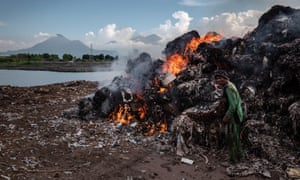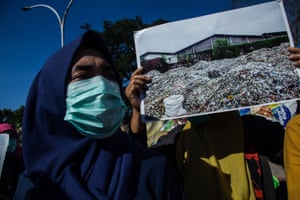2019.11.15; Friday November 15th, 2019: Indonesia's food chain turns toxic as plastic waste exports flood in | Global development | The Guardian
Published by DB,
Indonesia's food chain turns toxic as plastic waste exports flood in
Study of chicken egg samples reveals presence of dangerous chemical compounds around areas where waste is dumped
Global development is supported by
Fri 15 Nov 2019 02.00 EST
A man burns imported plastic waste at a dump in Mojokerto, in Indonesia’s East Java province.Photograph: Ulet Ifansasti/Getty Images
Plastic waste exports to south-east Asia have been implicated in extreme levels of toxins entering the human food chain in Indonesia.
A new study that sampled chicken eggs around sites in the country where plastic waste accumulates identified alarming levels of dioxins and polychlorinated biphenyls long recognised as extremely injurious to human health.
The study is the first to demonstrate food chain contamination in south-east Asia with high levels of hazardous chemicals as a consequence of waste mismanagement and plastic waste imports.
According to the study, an adult eating just one egg from a free-range chicken foraging in the vicinity of the tofu factory in Tropodo would exceed the European Food Safety Authority tolerable daily intake for chlorinated dioxins by seventy-fold.
Researchers collected and analysed free-range chicken eggs from the Bangun and Tropodo communities in East Java, locations that have been inundated with imported plastic waste since China closed its doors to such waste in 2018.
By contrast, Indonesia’s import volume doubled between 2017 and 2018, with residents in some areas burning piles of plastic waste to reduce the volume clogging streets and piling up around houses. In Tropodo, the waste is used to fuel local tofu factories.
Eggs collected in the communities were found to contain highly hazardous banned chemicals including dioxins, flame retardants, and the toxic "forever chemical", perfluorooctanesulfonic acid (PFOS).Numerous studies have linked the chemicals found in the eggs with a host of health impacts. Dioxin exposure is linked to a variety of serious illnesses in humans, including cardiovascular disease, cancer, diabetes, and endometriosis. Flame retardant chemicals, short-chain chlorinated paraffins and polybrominated diphenyl ethers disrupt endocrine function and negatively affect reproductive health.
PFOS causes reproductive and immune system damage, and internal company documents indicate that manufacturers knew about its toxicity for decades, but continued making it.
"Plastic waste is a serious toxic chemical pollution problem," said Yuyun Ismawati, co-founder of Nexus3, one of the Indonesian NGOs involved.
"Our results should ring alarm bells in every community trying to deal with a tsunami of plastic waste. The global north needs to stop treating the global south as its waste bin."
Activists campaign against imported plastic waste near the US consulate general office in Surabaya, in Indonesia’s East Java province. Photograph: Suryanto Putramudji/NurPhoto/Getty Images
"It’s clear from the study that plastic pollution imperils human and environmental health not only from the visible deluge of plastic trash, but from the invisible chemical contaminants in plastics and those created when burning plastics."
Jindrich Petrlik of the Arnika Association, who also authored the report, said: "This study pulls back the curtain on how plastic waste carries toxic chemicals into the food chain. Reducing plastics production and the toxicity of plastic materials is really the only option for a toxics-free future.
In one location the level of dioxins in eggs collected near an Indonesian factory that burns plastics for fuel were similar to levels in eggs collected near the notorious Agent Orange hotspot in Bien Hoa, Vietnam, which is considered one of the most dioxin-contaminated locations on Earth.
The report – Plastic Waste Poisons Indonesia’s Food Chain – was compiled by researchers from the global environmental health network IPEN, along with the Arnika Association and several local Indonesian organisations.
Lee Bell, the report’s co-author, said: "These stark findings illustrate the dangers of plastics for human health and should move policy makers to ban plastic waste combustion, address environmental contamination, and rigorously control imports.


